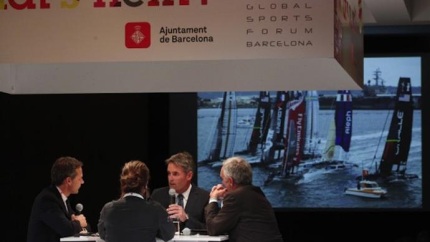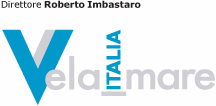IN EVIDENZA
press orc fireball the ocean race europe fiv attualità regate palermo-montecarlo techno293 52 super series star
AMERICA'S CUP
Coutts and Peyron tell transformative tale at Global Sports Forum

redazione
ORACLE Racing CEO Russell Coutts and Energy Team skipper Loïck Peyron addressed the question, 'Sailing: what's next?', on a panel at the Global Sports Forum in Barcelona on Friday.
Both men emphasized the transformative nature of the changes to this edition of the America's Cup and how they will help to draw in both younger participants and a younger audience, with new broadcast initiatives and an incredibly exciting new class of boat to race.
“When you think about where sailing was until recently, it’s not such a massive leap of imagination to realise the old methods were not going to continue to work,” Coutts said, explaining the thinking behind the changes. “Look at the way it was televised and the amount of delays there were in the races in those slow boats. Frankly the broadcasters didn’t even have an idea of how long the races were going to last for.
“Just imagine going to a broadcaster and not being able to tell them how long a race would be going on for? What we are seeing in sailing today is a real revolution and there is a lot of good work going on to reinvent what is a wonderful sport.”
Shorter races, close to shore, in full view of the public, along with transformative television coverage are the pillars of the changes, Coutts said. And then there are the boats.
Loïck Peyron, long an accomplished multihull sailor, spoke about the switch to wing-sailed catamarans with unbridled enthusiasm:
"Why multihull? Well, when you see an F1 driver, you don't say, 'I'm also a driver' because you have a car. You just don't think like that. And it should be the same when you see top level sailing. We have to focus on the high level skills needed to sail these boats. Many people love to sail and to cruise, but very few know how to race and only the smallest fraction can win races on boats like these. With multihulls, every time you make a mistake, it can be quite spectacular."
Coutts agreed. "I think people will recognize the skill involved in trying to get one of these boats around the course, let alone trying to beat the hell out of each other and push it to the absolute limits and sometimes beyond."
He also said the new boats and new format demanded a new breed of sailor and already this has brought an injection of new blood into the Cup.
"We're already seeing some of the great Olympic sailors like Ben Ainslie (BAR), Iain Percy (Artemis Racing), and Nathan Outteridge (Team Korea), coming in and making their mark. Up until now there have been a lot of older people involved in the racing, but now, with the boats becoming much more athletic, you have to react much quicker and it's bringing in a new style of sailing and a new type of sailor," he said.
"We're really bringing out the athletic side of the sport… These boats are very physically demanding and I think that's a good thing for the future." - ph. © Global Sports Forum
11/03/2012 02:05:00 © riproduzione riservata
Tweet
CORRELATI
DELLA SETTIMANA
Monfalcone pronta per il Campionato Mondiale ORC Double Handed 2025
Monfalcone si prepara a diventare, dal 7 al 13 settembre 2025, il palcoscenico internazionale della grande vela d’altura con il Campionato Mondiale ORC Double Handed 2025, ospitato dallo Yacht Club Monfalcone
Palermo-Montecarlo: Line Honours e record per Black Jack
Black Jack taglia la linea tra il fato del molo di sopraflutto di Port Hercules e la boetta stroboscopica dello YCM alle 02:53:13, persino prima del previsto, bruciando per qualche minuto i gommoni del club e dei media usciti a immortalare il momento
Palermo-Montecarlo: tutti i vincitori
Partita martedi 19 agosto dal golfo di Mondello, la Palermo-Montecarlo organizzata dal Circolo della Vela Sicilia ha coinvolto 45 imbarcazioni iscritte, 36 partenti, 27 arrivate regolarmente entro il tempo limite sul traguardo, e 9 ritirate
American Magic si prende la testa della Puerto Portals 52 SUPER SERIES
American Magic Quantum Racing mette la marcia della consistenza, tra i salti di vento, i recuperi e la media di giornata, riporta la corazzata americana in testa alla classifica. I giochi si aprono con una bella vittoria di Alkedo Vitamina
The Ocean Race Europe: Paprec Arkéa sorpassa Biotherm
Scendendo lungo la costa portoghese durante la notte, l’equipaggio di Yoann Richomme ha preso la testa della gara, arrivando questa mattina nel Golfo di Cádiz con Biotherm e Holcim-PRB subito dietro
Techno 293: Teresa Medde si riconferma campionessa del mondo
Con una splendida performance che la incorona sul podio già ben tre prove prima della fine, l'atleta del Windsurfing Club Cagliari Teresa Medde si riconferma campionessa del mondo della classe Techno 293
Formia: partito il Campionato Italiano Giovanile Classi In Doppio
Difficile immaginare un inizio migliore. La classe 420 ha disputato tre prove, le altre classi: 29er, RS Feva, e i catamarani Nacra 15, Hobie Cat 16, Hobie Dragoon ne hanno corse quattro
The Ocean Race Europe: 4° posto a Cartagena per “Allagrande Mapei”
Dopo oltre 1.500 miglia percorse tra Portsmouth e Cartagena, Ambrogio Beccaria, Thomas Ruyant, Morgan Lagravière, Manon Peyre e Pierre Bouras hanno concluso una seconda tappa ricca di colpi di scena, arrivando in quarta posizione
Mondiale Fireball: sempre in testa i britannici DJ Edwards - Vyv Townend
Campionato del Mondo Fireball – Day 2: Garda Trentino in formato classico, spettacolo e tecnica al massimo livello
The Ocean Race Europe: Biotherm concede il Bis a Cartagena
Vince il team di Paul Meilhat con Holcim PRB e Paprec Arkéa che completano il podio di questa seconda tappa
